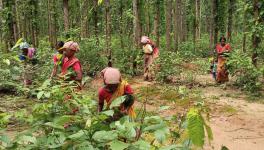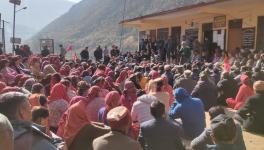‘Ecotourism Will Reduce Adivasis to Workers on Their Own Land’

Image Courtesy: Medium
In a bid to open up forest land for business the Centre is said to be coming up with draft guidelines on ecotourism. The new notification will enable forest land to be used for tourism opportunities, including the creation of zoos and initiation of safaris, among other activities.
The Hindustan Times reported that on March 8, “the government published minutes of the 61st meeting of the standing committee of the national board for wildlife held on February 18 over the matter.” The environment ministry’s forest advisory committee (FAC) in February eased norms for ecotourism projects by allowing them to build “non-permanent” structures in protected areas without the Centre’s permission. More importantly, multiple activities, which were not a party of forestry earlier and required permissions, such as zoos and safaris, will not be a part of “non forest activities” any longer, thereby not requiring permission.
The move to open up forest land for ecotourism has been criticised as one intended to adversely ignore tribal rights and land claims.
Speaking to Newsclick, Sricharan Behera of the Campaign for Survival and Dignity, a non-profit working for tribal rights, said: “This is a strategy by corporates to make inroads into tribal lands and forest lands; not just to grab the land but also to grab resources. The move is meant to lead tribals away from their traditional practices of resource conservation. Ecotourism is a profit making endeavour. Over time, the community, with its collective resources, has turned into a market. The ecotourism industry is not an old phenomenon. Now the concept is promoted by private parties facilitated by the government, insisted of by corporates. The new proposals will therefore be an extension of this. The tribals’ land, that which they are emotionally attached to, gets taken away. More importantly, ecotourism aims to remove dependency on forest produce. Tribals will be made to work like labourers in the eco-tourism projects and lose control over the land.”
The government has paved the way for the opening up of forest lands by deleting two key clauses in the Forest Conservation Act, 1980, and the Forest (Conservation) Rules, 2003. These clauses mandated that ecotourism is not by nature a forestry activity and thus, required prior clearance. With the new changes the states will not be required to take permission from the Center to lease out any forest to a private party.
Jitu Jaksika, a tribal activist from the Bahujan Samaj Party (BSP) and a member of the Dongria community has been fighting against ecotourism projects in Niyamgiri hills. He told Newsclick that “our people do not want to give up this land. We are not getting our space, our pattas. If we give this land our people will suffer. When the project begins people will want to come and see the tribals, the guides will come and use the community for their entertainment; they will bribe us to take pictures etc,” he added.
The move is legally seen as impermissible and also in direct conflict with the narrative of conservation being propagated by the government.
“When it comes to conservation they make claims like the figures of the forests are going up. Even after diverting so much forest area they clear the project with much pride and say they aren't stopping any project. They have to see whether the diversion of the forest land is required. Secondly, when the government makes claims about plantations when land is diverted, this needs to be understood carefully. If the land is diversified where is the land for compulsive afforestation? If you divert land in Himachal and do afforestation somewhere else that doesn't make any sense. Moreover, the government is taking away rights for the purpose of so-called development but actually they are not recognising rights,” said environmental lawyer Rahul Chaudhary.
Get the latest reports & analysis with people's perspective on Protests, movements & deep analytical videos, discussions of the current affairs in your Telegram app. Subscribe to NewsClick's Telegram channel & get Real-Time updates on stories, as they get published on our website.
























